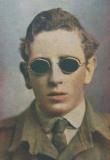Tom Skeyhill was born at Terang, Victoria, the son of Irish immigrants. After completing his education at St Mary's Convent School, Hamilton, he worked as a telegraph messenger and telephonist. A regular competitor in elocution and debating competitions with the Hibernian Society, he earned a significant reputation as a reciter in his teenage years.
Skeyhill enlisted in the Australian Imperial Force in August 1914 and landed at Anzac Cove as a signaller on 25 April 1915. Several weeks later he was blinded by an exploding Turkish shell, an event that Jeff Brownrigg in his biography of Skeyhill, Anzac Cove to Hollywood (2010), argues as probably fabricated. Skeyhill wrote verse during his convalescence and in November 1915 he recited a number of these in full Gallipoli uniform at Melbourne's Tivoli Theatre. Some of these compositions had been previously published in the London, Cairo and Melbourne press and in December they were collected in book form as Soldier Songs from ANZAC, 'Written in the Firing Line by Signaller Tom Skeyhill'. The collection proved extremely popular, requiring five editions and selling more than twenty thousand copies in four months. As Signaller Tom Skeyhill, 'the blind soldier poet', he toured Australia, lecturing, reciting and raising money for the Red Cross. He was discharged in September 1916 and left Australia the following year to begin a lecturing tour of North America.
Continuing to speak in uniform as Signaller Tom Skeyhill, he shared the stage with a number of prominent Americans, including an evening at Carnegie Hall with Theodore Roosevelt where more than twenty three million dollars was raised for the war effort. Roosevelt later said of him, 'I would rather be on the platform with Tom Skeyhill than any man I know.' In 1918 an operation, again according to Brownrigg probably a fabrication, restored Skeyhill's sight and a year later another collection of his verse was published by the Knickerbocker Press. Throughout the 1920s he toured most of the United States of America, speaking on such topics as 'Napoleon', 'Mussolini and the Black Shirts', 'The New Elizabethans' and 'A Young Man Looks at His World'. The lecture circuit brought wide public attention and wealth to support a residence in New York City, a summer home in Massachusetts and an aeroplane in which he travelled to his lectures. According to Brownrigg this part of Skeyhill's career was curtailed after an 'incident' at a hotel in Georgia, United States of America, caused a falling out with the lecture tour management.
In 1928 he was supposed to have completed two plays for Broadway (though no manuscripts have been found) events that might have introduced him to his future wife, the actress, Marie Adels. He also edited the diary of the well-known Tennessee war hero Alvin C. York who had won the Congessional Medal of Honor for single-handedly capturing more than one hundred German soldiers. Sergeant York, His Own Life Story and War Diary (1928) and a later biography, Sergeant York, The Last of the Long Hunters (1930) strengthened the public profile of York and served as a source for a 1941 Hollywood movie, starring Gary Cooper. Brownrigg points to these books about York as providing Skeyhill with a steady source of income.
Skeyhill continued his career on the lecture circuit into the 1930s, speaking about Sergeant York and drawing on many of the topics that had made him famous in the previous decade. He died unexpectedly on 22 May 1932 after a plane he was piloting crashed near his Massachusetts summer home.
 4458082644847374085.jpg
4458082644847374085.jpg

